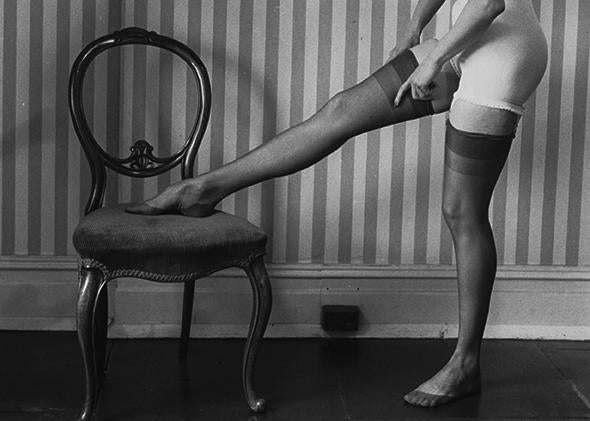Frances Wray doesn’t know the first thing about being a landlady. The first thing about being a landlady is that under no circumstances should you sleep with your young married female lodger, especially if it’s 1922. But given that Frances is the protagonist of a novel by Sarah Waters, a torrid lesbian affair is perhaps only to be expected. The question in Waters’ new book, The Paying Guests, is just how spectacularly Frances’ decision will lead to disaster—and whether or not she will find a path through the wreckage to the other side.
Waters, who was born in Wales in 1966, has carved out an unusual spot in fiction. Her six novels, beginning with Tipping the Velvet in 1998, could be called historical fiction, but that doesn’t begin to capture their appeal. It is closer to say that she is creating pitch-perfect popular fiction of an earlier time, but swapping out its original moral engine for a sensibility that is distinctly queer and contemporary, as if retrofitting a classic car.
Her books offer something like an alternate reality—a literary one, if not a historical one. There may have been lesbian male impersonators working the London music halls in the 1890s, as in Tipping the Velvet, but there were certainly not mainstream novels devoted to their inner lives and sexual exploits. Waters gives such characters their say in books that imitate earlier crowd-pleasers in their structure, slang, and atmosphere, but that are powered by queer longing, defiant identity politics, and lusty, occasionally downright kinky sex. (An exception is her last novel, The Little Stranger.) The most masterful of these books so far is Fingersmith, a Wilkie Collins-esque tale full of genuinely shocking twists (thieves, double-crossing, asylums, mistaken identity, just go read it). The saddest is The Night Watch, a tale told in reverse of a group of entwined characters during and after World War II. But among many readers she is still most beloved for Tipping the Velvet, a deliriously paced coming-of-age story that is impossible to read in public without blushing.
After 2009’s The Little Stranger—a classic haunted-house novel set in 1949 that actually contains less Sapphic tension than models like The Haunting of Hill House or Rebecca—the erotic charge of The Paying Guests marks something of a return to form. Twenty-six-year-old Frances and her mother live in genteel but straitened circumstances on leafy Champion Hill, which “kept itself to itself. … You’d never guess that a mile or two further north lay London, life, glamour, all that.” To cover expenses and fill a large house left nearly vacant by the death of Frances’ father, the loss of her beloved brothers in the war, and the departure of the servants, they have decided to take in a couple of lodgers—or, as it’s apparently more polite to call them, “paying guests.”
From the moment the young couple—Mr. and Mrs. Barber, or, as Frances eventually learns to call them, Leonard and Lilian—pull up at the door with their cart of possessions, there is a charge to their interactions with Frances. Mrs. Barber slips off her shoes to avoid dirtying the floors Frances spends hours polishing: “She left small damp prints on the wax. Her stockings were black ones,” Frances observes. Mr. Barber makes cracks about whether she should try growing some big cucumbers in her garden. Their class differences from their hosts are immediately apparent in the bohemian clutter with which Mrs. Barber decorates their rooms, and in Mr. Barber’s whistling and bland interest in their engravings. Champion Hill people these are not.
But, Waters makes clear, this kind of mingling is just one weird aftereffect of a war that has changed the rules. With millions of young men dead or wounded (casualties were particularly high among the upper classes), women newly acquainted with work and in possession of the vote, and the old servant system fading away, England is undergoing a certain pancaking of its social order. To the embarrassment of her mother and the neighbors, Frances spends her days doing a truly horrifying amount of housework, cooking pies for lunch and bargain-shopping and scrubbing the floor tiles by hand.
The housework, in fact, seems to be where she is sublimating a vital sexual drive. “How pleasing each glossy tile was. The gloss would fade in about five minutes as the surface dried; but everything faded. … There were longings, there were desires. … But they were physical matters mostly, and she had no last-century inhibitions about dealing with that sort of thing.” After long days she slips into bed: “She liked to smoke like this, naked in the cool sheets, with only the hot red tip of a cigarette to light her fingers in the dark.”

Photo by Charlie Hopkinson
Small wonder, then, that the presence of the sensitive, nubile Lilian sends this tamped-down sensuality shooting out beyond its stays. The first half of the book traces the women’s growing interest in each other, which gradually becomes out-and-out flirtation—and then, on one highly eventful night, irrevocably crosses the line. They tumble into a full-blown sexual affair, barely dodging the two other inhabitants of the house, heedless of the risk. “How had things changed so utterly, so rapidly?” Frances asks herself. “She felt as alive as a piece of radium.”
This situation is as unsustainable as it is thrilling—but what are they to do? It is, after all, London in 1922: not an impossible milieu for two women in love, but certainly an inhospitable one. Frances, it emerges, has already given up a great deal—a relationship with another young woman, a writer and activist—to take care of her mother and do all that housework. Sacrifice is in the air, as everyone has sacrificed in the war. And yet, suddenly, she is willing to sacrifice no more. “I’m sick to death of living falsely. I’ve been doing it for years,” she tells Lilian. Letting her other love go “seemed at the time like a brave thing to do. But it wasn’t bravery. I was a coward. I won’t be a coward with you.”
With this slightly melodramatic speech, the Watersian universe departs from what a novel actually of this period could dare to say. Radclyffe Hall’s Well of Loneliness, published in 1928 and the subject in England of a widely publicized obscenity trial, features a noble butch protagonist, Stephen Gordon, just a few years older than Frances and similarly at loose ends after the World War I. In the end, Stephen tricks her adoring young girlfriend into thinking she has betrayed her, solely in order to make the younger woman fall in love with a man and preserve her from the terrible fate of lesbian love in between-wars England. “I can’t give her protection or happiness,” Stephen says, and then intentionally breaks both their hearts. (It’s notable that the “obscene” Well of Loneliness is positively chaste compared to Waters’ book, as well as far less entertaining: as Virginia Woolf wrote to a friend, “The dullness of the book is such that any indecency may lurk there—one simply can’t keep one’s eyes on the page.”)
So, asks The Paying Guests, what would a novel of that era looked like if the lovers rejected that sacrifice? This decision, after a slow build to the book’s halfway point, suddenly sends the plot careening in another direction. Illegal abortion, manslaughter, lies, the grinding suspense of the courtroom: Waters doesn’t sugarcoat the consequences of this romance and the secrecy surrounding it. She just makes her lovers a little more stalwart and unapologetic than most women of the time, real or fictional, could probably be.
The drawn-out noir tale that The Paying Guests becomes is a chilly one, despite the heat at its center. Both Frances and Lilian can seem callous, preoccupied with each other to the point that they don’t care who else gets hurt. “Don’t you see what it means?” Frances says toward the end as a ray of light begins to shine onto their dark situation. (Waters does seem to revel in the kind of ending that, until recently, fictional lesbians were nearly always denied.) “It means we’ve done it. The whole horrible business—it means it was worth it.” A lot of eggs have to get broken to make this omelet, though Waters eventually fills in a backstory that suggests some of the eggs may have had it coming.
But perhaps that’s just what happens when you return to an era where sacrifice was demanded and trace the course of ordinary self-fulfillment instead—this being the modern moral high ground for a woman who falls in love with another woman. Today, there are prize nominations instead of obscenity trials for a novel like The Paying Guests. And in the United Kingdom and much of America, Frances and Lilian’s dilemma would end boringly: a simple divorce and two women getting married, no bloodshed required.
—
The Paying Guests by Sarah Waters. Riverhead Books.
See all the pieces in this month’s Slate Book Review.
Sign up for the Slate Book Review monthly newsletter.
